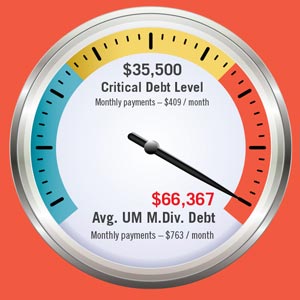Receiving a college acceptance letter is wonderful. Earning a degree from that college or university is even better. Paying for higher education is something entirely different.
According to CNN, more than 40 million people in the United States have some college debt. Research shows that clergy and candidates for ordination younger than age 35 commonly identify finances and debt as barriers to ordination and other professional goals in ministry.
The General Board of Higher Education and Ministry is working to address student debt concerns. A 2012 General Conference mandate created a Seminary Indebtedness Task Force to reduce and eliminate United Methodist clergy debt.
Initial findings from task force research revealed that nearly three out of four United Methodist Master of Divinity graduates in the 2013-14 academic year borrowed money to finance their education. The total average debt for these students was around $66,000; yet, based on the median clergy salary of $49,742, their total school debt should not exceed $35,500.
 |
| GBHEM/Betty Elrod |
While the critical issues that students and graduates face are clear, the resources and knowledge available to help consolidate and even prevent debt is not always as obvious. Higher Education and Ministry is working to share the research and facts behind the rising debt issues, while bringing resources and solutions to light.
Higher Education and Ministry staff are facilitating conversations with denominational constituents who can assist those God calls into ordained and licensed ministry. Because of these ongoing talks with constituents, institutions and foundations, grants are now available to support United Methodist related schools and students.
Allyson Collinsworth, executive director of scholarships at Higher Education and Ministry, recognizes that support needs to be set in place, so new students may benefit from grants and scholarship programs before their financial debt becomes a serious burden.
Every grant and scholarship offered ultimately makes a personal impact on a student's life.
Educational assistance is available at all levels of The United Methodist Church for candidates in ministry. In fact, assistance is available to all members of The United Methodist Church who are pursuing vocations outside of seminary or ordination, and attending any accredited institution of higher education. Students should inquire about opportunities from their local church, theological school, annual conference and the general agencies and foundations of the church.
Higher Education and Ministry provides $5 million each year in loans and scholarships to undergraduate, graduate and some doctoral United Methodist students seeking to fulfill their academic and vocational calling.
Heather Jarvis, a student loan expert, leads efforts to establish and expand student debt-relief programs and to inform borrowers, schools and employers about how to benefit from available debt-relief programs.
Raising awareness of available resources like low interest rate loans, scholarships and grants is the first step in helping students ease the burden of debt. With clear goals, along with help and guidance from Higher Education and Ministry, the seemingly insurmountable challenges surrounding student debt can start to be alleviated, lighting the path for tomorrow's leaders in the church.
Betty Elrod is digital communications specialist at the General Board of Higher Education and Ministry, Nashville, Tennessee.
One of seven apportioned giving opportunities of The United Methodist Church, the World Service Fund is the financial lifeline to a long list of Christian mission and ministry throughout the denomination. Please encourage your leaders and congregations to support the World Service Fund apportionment at 100 percent.





